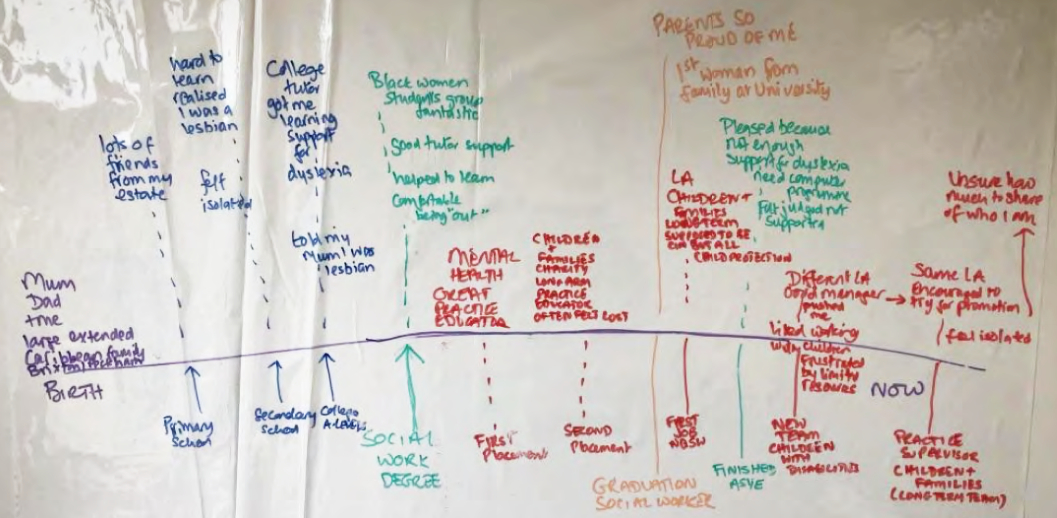Creating social and group connection through a lifeline exercise
Jane Ferguson is a Lecturer in Healthcare Management teaching on the NHS commissioned Elizabeth Garrett Anderson Graduate Management Training Scheme. Her role involves provide academic and pastoral support to NHS professionals engaged in the two-year programme leading to an MSc Healthcare Leadership. She uses a lifeline exercise with her cohort – NHS leaders – as a tool to develop group bonding, reflective skills (core to leadership practice) and support transition in career development.
While lifelines exercises may differ in the way they are applied to a specific context, what they have in common is drawing a ‘lifeline’ representing the ups and downs and key events that have influenced an individual and made them who they are.
In this course, students were divided in groups of four, they already knew each other but lifelines exercises can be used effectively in early stages of group socialisation or at key transitions. In this case:
- Students were asked to draw their own life timeline, charting their life journey from birth to now. They were given free rein to map out their journey but always noting/highlighting important ideas, people and experiences that had influenced them.
- Students were invited to reflect on their learning from these ‘moments’, with particular reference to their professional identity and work as leaders.
- Students were given a time scale for completing this group exercise: 1 hour, 15 minutes for each member of the group. Students were left to themselves, no academic was present during their group activity.
- Students were asked to develop and agree ground rules and asked to respect confidentiality. Lifeline exercises are intended to bring down barriers between individuals but they also may make participants feel more vulnerable to peers. Thus in all cases, students could disclose as much or as little as they felt comfortable sharing with others.
- In order to facilitate students being able to tell a story of who they are. A core set of questions were provided:
- Background – who are you? Do you have any sibling? Where are you in relation to others in your family/workplace?
- Key figures – who were the key figures in your life and career and how did they influence your life/career/thinking?
- Values and norms – what were the dominant cultural values and norms of your family and work settings?
- Life events – what are the significant life events you experienced?
- Learning – what has been your experience of learning? What important lessons do you recall?
- What has surfaced for you in doing this activity that will impact your leadership practice?

Example lifeline exercise courtesy of ‘Department of Education (2019) PSDP Resources and Tools: Lifeline exercise’ (see references below for full document).
Potential Wider application
Lifeline exercises have a potentially wide range of application on a number of situations:
- To support year 1 students transition to Higher Education and University life
- To develop group bonding at any level but particularly where an initial socialisation has taken place
- In programmes or units where student cooperation, collaborative skills are pursued e.g. as a tool to facilitate group work
- In programmes or units where there is an element (or ILO) of reflexivity and development of reflection skills
- In groups with significant intercultural divides
- For staff development in particular career planning
In such different situations the leading questions can be easily adapted e.g. How has your cultural background has and shapes who you are? How has your experience at Manchester has shaped who you are? What has surfaced for you in doing this activity that will impact your learning?
Evaluation / Student Feedback
Benefits
When the lifeline exercise has been done with students in the NHS programme but also as an activity within the teaching team, it has been observed
- Students have learned about each other
- Students came together as a group, more tightly
- Lifeline fosters cooperation and caring
Top Tips
- Provide basic ground rules for the group(s) to review and adhere to
- Give questions to group before the session takes place to avoid catching students on their back foot
- Some students may fall in the trap of providing a CV type account.
- The exercise can be repeated where students are moved to another group or repeated at a later point in the programme
References
Andy Chan, Life Line exercise template. Stanford Graduate School of Business https://www.gsb.stanford.edu/sites/gsb/files/alumni-migration/files/alumni_migration/career/careerlifevision/pdf/Lifeline_Exercise.pdf
NHS, Lifeline exercise – decision making https://www.healthcareers.nhs.uk/career-planning/resources/life-line-exercise
NHS https://practice-supervisors.rip.org.uk/wp-content/uploads/2019/11/Lifeline-exercise.pdf

School: AMBS
Discipline: Health Management
Academic: Jane Ferguson
Course: NHS Leadership Academy
Cohort Size: 16
Themes: Student community
Ref: 030

0 Comments